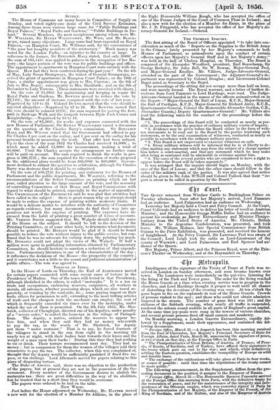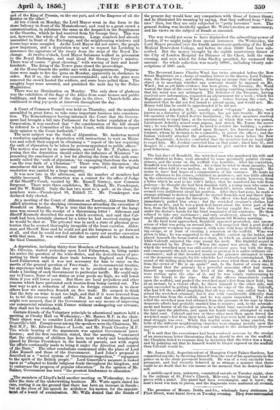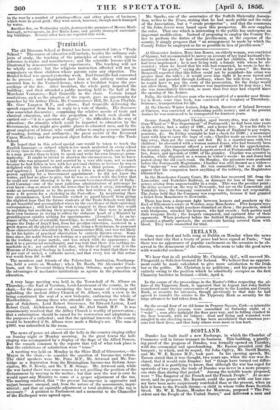aittruptio.
Intelligence of the signature of the Treaty of Peace at Paris was re- ceived in.London on Sunday afternoon and soon became known over town. The Londoners were immediately on the qui-vive, listening for the firing of the Park and Tower guns. The order for the firing reached the Horse Guards at a time when evening service was in progress in the churches, and Lord Hardinge thought it proper to wait until all chance of disturbing the devotions of the evening was over. At ten o'clock the guns began to fire on the esplanade in rear of the Horse Guards. Crowds of persons rushed to the spot ; and those who could not obtain admission lingered in the streets. The number of guns fired was 101; and the stillness of the Sabbath ,evening, when nearly all traffic is suspended, rendered the solemn sound audible in all parts of England's great capital. At the same time joy-peals were rung in the towers of various churches, and several private persons fired off email cannon and musketry,
On Monday ramming, a London Gazette Extraordinary, rapidly fol- lowed by a Supplement, made their appearance, and contained. the fol- lowing documents.
"Foreign Office March 31.—A despatch has been this morning received from the Earl of Clarendon., her Majesty's Principal Secretary of State for Foreign Affairs, dated Parrs, March 30, announcing the signature of peace, at two o'clock on that day, at the Foreign Office in Paris. "The Plenipotentiaries of Great Britain, of Austria, of Trance, of Prus- sia, of Russia, of Sardinia,. and of Turkey, have affixed their signatures to the treaty which puts an end to the war ; and which, while definitively settling the Eastern question, establishes the -tranquillity of Europe on solid and durable bases.
"The exchange of the ratifications will take place at Paris in four weeks, or sooner if possible : until that time the stipulations of the treaty cannot be made public." The following announcement, in the Supplement, differs from the pre- ceding document in the position it assigns to the Emperor of Russia.
" koreign Office, March 31.—The „Honourable -Spencer Ponsonby arrived at the Foreign Office this morning from Paris, with the definitive treaty for the restoration of peace, and for the maintenance of the integrity mid inde- pendence of the Ottoman empire, which was yesterday signed at Paris by the Plenipotentiaries of her Majesty, of the-Emperor of the French; of the King of Sardinia, and of the Sultan, and .also of the :Emperor of Austria
and of the King of Prussia, on the one part, and of the Emperor of all the Russias on the other.'
At ten o'clock on Monday, the Lord Mayor went in due form to the atone balcony in front of the Manaionhouse, and read to a great crowd a communication, in substance the same as the despatch in the Supplement to the Gazette, which he had received from Sir George Grey. This MILS not, however, the whole of the ceremony. Large numbers had already assembled infront of the Exchange, and the neighbouring. windows and house-tops were occupied. As the Lord Mayor did not arrive the people grew impatient, and a deputation was sent to request his Lordship to announce the signature of the treaty from the steps of the Royal Ex- change. At twelve o'clock, Lord Mayor Salomons walked in procession to the Royal Exchange, and read aloud Sir George Grey's missive There was of course great cheering," with waving of hats and hand- kerchiefs. The firing of the Tower guns closed the proceedings.
At the Horse Guards the public met with a disappointment. Prepara- tions were made to fire the guns on Monday, apparently in obedience to order. But if so, the order was countermanded; and as the guns were removed the crowd hooted the soldiers and some boys pelted them. The naughty boys were arrested, and punished the next day by the Police Magistrates.
There was no illumination on Monday. The only show of gladness was the exhibition of the flags of the Allies from some houses and public buildings, and from some of the ships in the river. Church-bells also continued to ring joy-peals at intervals throughout the day.
A Court of Common Council was held on Thursday, and the members assembled in great force, to take some important business into considera- tion. The Remembrancer having informed the Court that the Govern- ment had brought a bill into Parliament for the better regulation of the Corporation, it was resolved that "the consideration of the bill should be referred to a Committee of the whole Court, with directions to report their opinion to the Court forthwith."
The next subject was the Oath of Abjuration. Mr. Anderton moved a resolution appointing a deputation with instructions to wait on Minis- ters and solicit their support in obteining a "repeal of the law requiring the oath of abjuration to be taken by persons appointed to public offices.' The motion was met by an amendment, moved by Mr. T. Parker, pro- posing that the deputation should solicit the influence of Ministers in procuring the enactment of a law for altering the form of the oath com- monly called the oath of abjuration,' by expunging therefrom the words on the true faith of a Christian.: " There was little discussion : the amendment did not find favour, and was negatived ; and the original resolution was carried by a large majority.
It was now late in the afternoon, and the number of members had Visibly-increased. The attraction was a contest for the office of judge Of the Sheriff's Court, vacated by Mr. Russell Gurney, now Common Sergeant. There were three candidates, Mr. Ryland, Mr. Prendergast, and Sir IV. Riddell. Only the last two went to a poll : at its close, the numbers were—Prendergast 98, Riddell 77. Mr. Prendergast was declared duly elected.
At a meeting of the Court of Aldermen on Tuesday, Alderman Sidney calleirattention to the shocking circumstances nttending the execution of Benefield on Monday. Was it true that the nervousness of the hang- man was caused by the receipt of a threatening letter ? Alderman and Sheriff Kennedy described the scene which occurred, and said that Cal- -craft had been certainly alarmed by a letter-he had received stating that he would be shot at. The prisoner was in such a state of physical pros- tration that he seemed thoroughly incapable of the least exertion. Alder- man and Sheriff Rose said he could not get the hangman to go forward at all, and that he could not feel satisfied to carry out another execution with that man. It was ordered that the matter should be referred to the Gaol Committee.
A deputation, ineluding thirty-four Members of Parliament, headed by Mr. Oliveira, waited yesterday upon Lord Palmerston, to bring under his notice the cprestion of the wine-duties, and the desirableness of pro- moting by their reduction freer trade between England and France. Lord Palmerston said it was -not necessary for him to enter on the merits of the general question of Free-trade. As to commercial treaties, his experience told him that they are to be avoided as far as they in- -elude a binding of each Government to particular tariffs. He could only say to France Some of our -duties on your goods are high, we will lower them if you will lower yours. But there are local prejudices and other reasons which have prevented such treaties from being carried out. The best way to get a reduction of duties in foreign countries is to show others how we ourselves flourish on free trade. He seemed to think that the duty on wine is not too high, and that if it were lowered from Is. to 6d.- the revenue would suffer. But he said that the deputation might rest assured, that if the Government see any means of improving our commercial relations with France without endangering our revenue, they shall not be overlooked.
-.Certain friends of the Voluntary principle in educational matters held a meeting at Crosby Hall on Wednesday,—Mr. Barnes M.P. in the chair. Their object was to consider Lord John Russell's resolutions and Lord Granville's -bill. Conspicuous among the speakers were the Chairman, Mr. Bell M.P., Mr. Edward Baines of Leeds, and Mr. Frank Crossley 11.P. Ile whole bearing of the arguments was against Government inter- ference; and the that resolution statod, that the meeting, "convinced that the education of children has been most wisely and beneficently placed by Divine Providence in the hands of parents, saw with regret the efforts continually made to bring it under the direction and control of the State." The ether resolutions condemned alike the plans of Lord John Russell and those of the Government. Lord John's proposal is described as a "novel system of Government-inspection," repugnant to the spirit of the British people." Lord Granville's measure is looked upon as "adapted to kindle religious feuds throughout the kingdom, and to embarrass the progress of popular education.' In the opinion of Mr. Bslues, Government has been the greatest hinderance to education."
The members of Iloyd's held another meeting on Wednesday, to con- Sider the state of the underwriting business. Mr. Watts again stated his case, resting it on the ground that there has been an increase in frauds ; but at the close of his speech he withdrew his motion for the appoint- twat pf a board of examination. M. Wills denied that the frauds of
the present day would bcar any comparison with those of former times ; and Ic illustrated his meaning by saying, that they suffered from "felo- nies" then, but they are only subjected to "petty larcenies" now. The general feeling was decidedly against Mr. Watts's motion as mmecesaary, and his views on the subject of frauds as unsound.
The war would not seem to have diminished the subscribing-power of London, if we might judge from special instances. On Wednesday, the Lord Mayor presided over the fourth anniversary-gathering of the Royal Medical Benevolent College, and before its close 2000/. had been sub- scribed. But the money brought by the eighth anniversary dinner of the City of London Hospital for Diseases of the Chest, held the same evening, and over which Sir John Shelley presided, far surpassed this amount : the whole collection was nearly 50001., including twenty sub- scriptions of 100/. each.
The Reverend James Charles Ward has twice attended before the Bow Street Magistrate on a charge of sending letters to the Queen, Lord Palmer- ston, Sir George Grey, and others, denoting an insane state of mind. The object is to ascertain whether any restraint should be imposed on Mr. Ward ; but as yet little evidence has been given. On Tuesday, Mr. Ward wasted the time of the court for hours by making rambling remarks to show that his mind was not unhinged. The Solicitor of the Treasury, having received new information, requested an adjournment for a week ; which the Magistrate granted. Mr. Ward is at large . before leaving the court, he intimated that he did not feel bound to attend again, and would not. Mr. Henry told him he could be apprehended if he did not.
Lieutenant Ackerley R.N., usually called " Captain " Ackerley, well known as a disturber of public meetings, has got into trouble. He was a life-member of the United Service Institution' the other members resolved unanimously to expel him ; at the meeting at which this vote was passed, Lieutenant Ackerley seized some papers, and struck Mr. Tonna the secre- tary; he was forcibly removed ; he tried to reenter the building ; a police- man seized him; Ackerley called upon Besquet, his American Inthan at- tendant, whom he declares to be a constable, to arrest the officer; and the Indian violently attacked the policeman. When taken before the Bow Street Magistrate, Ackerley contended that the members had no legal right to expel hun. Mr. Jardine corrected him on that point ; fined him 51. and Besquet 11.; and required the Lieutenant to give sureties for his future good behaviour.
The last days of Bousfield, the wretched man who murdered his wife and three children in Soho, were attended by some peculiarly painful circum- stances, and the scene on the scaffold was horrible. After his conviotion, Bousfield was taciturn and sullen ; for a time he tried to sham insanity, but desisted when told it was useless, as the pretence was seen through. He seems to have had hopes of a commutation of his sentence. He made no direct allusions to his crimes exhibited no penitence, and was little affected by the exhortations of the Ordinary. There seems no doubt, however, from a letter which he sent to his wife's father, that he murdered his wife from jealousy—he thought she had been familiar with a young man who came to her cigar-shop. On Saturday, two of Bousfield's sisters visited him : he seemed very indifferent about his position. After they had gone he made a strange attempt to destroy himself—he started from his seat and gone, him- self head-foremost upon the fire-grate. The officer who had charge of him. immediately pulled him away; but the wretched creature's clothes had been set on fire and he was a good deal burnt about the lower part of the face, from the lick hair under his chin having caught fire; and he was under the doctor's hands for the brief remainder of his existence. Ile then refused to take any sustenance ; and only swallowed, almost by force, a small quantity of milk from Saturday afternoon till Monday morning. As the fatal hour approached, Bousfield appeared prostrated, and uncon- scious of what was going on around him : it is suspected that a good deal of this apparent weakness was assumed, with some wild hope of thereby effect- ing escape, or at least of creating a sensation on the scaffold. Wine was given to him ; he was supported to the scaffold, carried up the ladder, and placed beneath the beam seated on a chair, in which an assistant held him while Crdcraft adjusted the rope round his neck. The frightful sequel is thus narrated by the Times—‘‘ When the signal was given, the chair on which the wretched man was still seated of course gave way with the drop, and consequently the fall was not nearly so great as it is under ordinary cir- cumstances; and at this dreadful moment the prisoner attempted to carry out the desperate struggle for life which he had evidently contemplated. The sound of the falling drop had scarcely passed away when there was a shriek from the crowd of He is up again!' and, to the horror of every one, it was found that the prisoner by a powerful muscular effort had drawn himself up completely to the level of the drop, that both his feet were resting upon the edge of it, and he was vainly endeavouring to raise his hands to the rope. One of the officers immediately rushed upon the scaffold, and pushed the wretched man's feet from their hold; but in an instant, by a violent effort, he threw himself to the other side, and again succeeded in getting both his feet on the edge of the drop. Caleraft, who had left the scaffold imagining that all was over was called bash: he seized the wretched criminal ; but it was with considerable difficulty that he forced him from the scaffold, and he was again suspended. The short relief the wretched man had obtained from the pressure of the rope by these desperate efforts had probably enabled him to respire; and, to the astonish- ment and horror of all the spectators, he a third time succeeded in placing his feet upon the platform, and again his hands vainly attempted to re.ach the fatal cord. Calcraft and two or three other men then again forced the wretched man's feet from their hold, and his legs were held down until the final struggle was over. While this fearful scene was being enacted, the bells of the-different neighbouring churches were ringing merrily upon the announcement of peace, offering a sad contrast to the melancholy proceed- ing."
t is said that the executioner had been rendered nervous by the receipt of an anonymous letter threatening that he should be shot on the scaffold.: the Chaplain failed to reassure him by declaring that the letter was a hoax, and by pointing out that he himself would be longer exposed on the scaffold than Calcraft would be.
Mr. James Neil, Superintendent of Hampton Court Palace Gardens, lies committed suicide, by throwing himself from the roof of his apartments in the palace on to the stone pavement beneath. He was of a very excitable tem- perament, and had recently behaved in so strange a manner that there could be no doubt that he was insane at the moment that he destroyed him- self.
A middle-aged man, unknown, committed suicide on Tuesday night, dose to the railings of St. Peter's Church, Mile-end, by blowing his head to pieces with a pistol. The pistol had been overcharged, and it buret; the man's head was tom to pieces, and the fragments were seattered all around.
The premises of Diesel. Dobbs and Co., wholesale faney stationers in Fleet Street, were burnt down on Tuesday evening. alley were aurrovaik4 in the rear by a number of printing-offices and other places of business, which were in great peril: they were saved, however, though much damaged by water.
Another fire, on Wednesday night, destroyed the premises of Messrs Marl- borough, news-agents, in Ave Maria Lane, and greatly damaged surround- ing buildinp. Several other fires are reported this week.




































 Previous page
Previous page